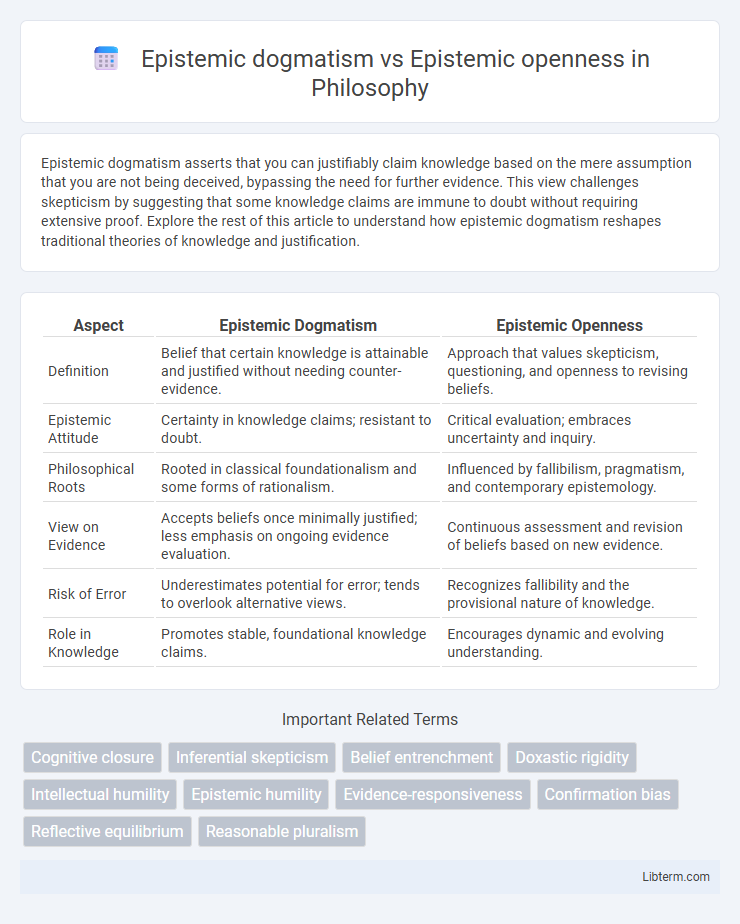Epistemic dogmatism asserts that you can justifiably claim knowledge based on the mere assumption that you are not being deceived, bypassing the need for further evidence. This view challenges skepticism by suggesting that some knowledge claims are immune to doubt without requiring extensive proof. Explore the rest of this article to understand how epistemic dogmatism reshapes traditional theories of knowledge and justification.
Table of Comparison
| Aspect | Epistemic Dogmatism | Epistemic Openness |
|---|---|---|
| Definition | Belief that certain knowledge is attainable and justified without needing counter-evidence. | Approach that values skepticism, questioning, and openness to revising beliefs. |
| Epistemic Attitude | Certainty in knowledge claims; resistant to doubt. | Critical evaluation; embraces uncertainty and inquiry. |
| Philosophical Roots | Rooted in classical foundationalism and some forms of rationalism. | Influenced by fallibilism, pragmatism, and contemporary epistemology. |
| View on Evidence | Accepts beliefs once minimally justified; less emphasis on ongoing evidence evaluation. | Continuous assessment and revision of beliefs based on new evidence. |
| Risk of Error | Underestimates potential for error; tends to overlook alternative views. | Recognizes fallibility and the provisional nature of knowledge. |
| Role in Knowledge | Promotes stable, foundational knowledge claims. | Encourages dynamic and evolving understanding. |
Understanding Epistemic Dogmatism
Epistemic dogmatism asserts that one can know a proposition solely from the act of assuming its truth, emphasizing immediate justification without requiring external evidence. This stance contrasts with epistemic openness, which demands critical scrutiny and continual reassessment of beliefs in light of new evidence. Understanding epistemic dogmatism involves recognizing its commitment to self-evident knowledge and how it challenges traditional evidentialist frameworks.
Defining Epistemic Openness
Epistemic openness refers to the intellectual virtue of being willing to consider and evaluate new evidence or perspectives, even when they challenge one's existing beliefs or knowledge claims. This concept contrasts with epistemic dogmatism, which involves rigid adherence to established beliefs without adequately weighing alternative viewpoints. Emphasizing curiosity, flexibility, and critical reflection, epistemic openness fosters a dynamic and progressive approach to knowledge acquisition.
Historical Roots of Epistemic Dogmatism
Epistemic dogmatism traces its historical roots to ancient philosophical traditions such as Plato's theory of knowledge, where certain foundational beliefs were considered indubitable and justified without requiring further evidence. This stance contrasts with epistemic openness, which emerged prominently during the Enlightenment, emphasizing skepticism and the continual questioning of knowledge claims. The evolution from dogmatism to openness reflects shifting attitudes toward certainty, evidence, and the justification of knowledge throughout intellectual history.
Benefits of Epistemic Openness
Epistemic openness fosters intellectual humility and adaptability by encouraging individuals to critically evaluate evidence and consider alternative perspectives. This approach promotes robust knowledge growth and reduces cognitive biases, enhancing decision-making accuracy in complex or uncertain situations. Embracing epistemic openness ultimately supports collaborative learning and innovation across academic, scientific, and everyday contexts.
Cognitive Biases Fueling Dogmatism
Cognitive biases such as confirmation bias and the backfire effect play a significant role in epistemic dogmatism by reinforcing rigid belief systems and resisting contradictory evidence. These biases cause individuals to selectively accept information that aligns with pre-existing beliefs while dismissing or rationalizing opposing viewpoints, thereby limiting epistemic openness. Understanding and mitigating these cognitive biases is essential for fostering an environment where critical thinking and genuine inquiry can challenge dogmatic stance and promote intellectual humility.
The Role of Doubt in Knowledge Acquisition
Epistemic dogmatism asserts that certain knowledge can be acquired without doubt, emphasizing certainty and rigid belief systems, while epistemic openness promotes the continuous questioning and reconsideration of beliefs to refine understanding. Doubt functions as a critical cognitive tool in epistemic openness, enabling individuals to identify errors, challenge assumptions, and expand knowledge boundaries. By fostering a culture of skepticism and inquiry, epistemic openness enhances knowledge acquisition through adaptive learning and intellectual humility.
Social Implications of Epistemic Stances
Epistemic dogmatism, characterized by rigid adherence to fixed beliefs, often fosters social polarization and inhibits constructive dialogue, leading to fragmented communities. In contrast, epistemic openness encourages critical reflection and responsiveness to diverse perspectives, promoting social cohesion and collaborative problem-solving. These epistemic stances significantly shape public discourse, influencing trust in institutions and the collective capacity to address complex social issues.
Epistemic Virtues and Vices
Epistemic dogmatism, characterized by rigid adherence to beliefs without sufficient evidence, often manifests epistemic vices such as closed-mindedness and intellectual arrogance, undermining the pursuit of truth. In contrast, epistemic openness embodies virtues like intellectual humility and curiosity, fostering an environment conducive to critical inquiry and knowledge acquisition. Cultivating epistemic virtues enables individuals to navigate between skepticism and credulity, enhancing rational discourse and epistemic progress.
Strategies for Fostering Openness
Epistemic openness encourages the active consideration of alternative viewpoints and critical reflection on one's own beliefs, promoting intellectual humility and flexibility. Strategies for fostering openness include engaging in dialectical dialogue, practicing perspective-taking exercises, and cultivating a learning-oriented mindset that values evidence and reasoning over mere certainty. These approaches help mitigate epistemic dogmatism by creating environments where questioning assumptions and revising beliefs based on new information are normative.
Navigating Between Dogmatism and Openness
Navigating between epistemic dogmatism and epistemic openness requires balancing the certainty of established knowledge with the flexibility to revise beliefs in light of new evidence. Epistemic dogmatism emphasizes the confidence in justified beliefs, often resisting counter-evidence, whereas epistemic openness values continual inquiry and adaptive reasoning to refine understanding. Effective epistemic navigation involves critical evaluation of sources, willingness to question assumptions, and maintaining intellectual humility to accommodate evolving epistemic standards.
Epistemic dogmatism Infographic

 libterm.com
libterm.com